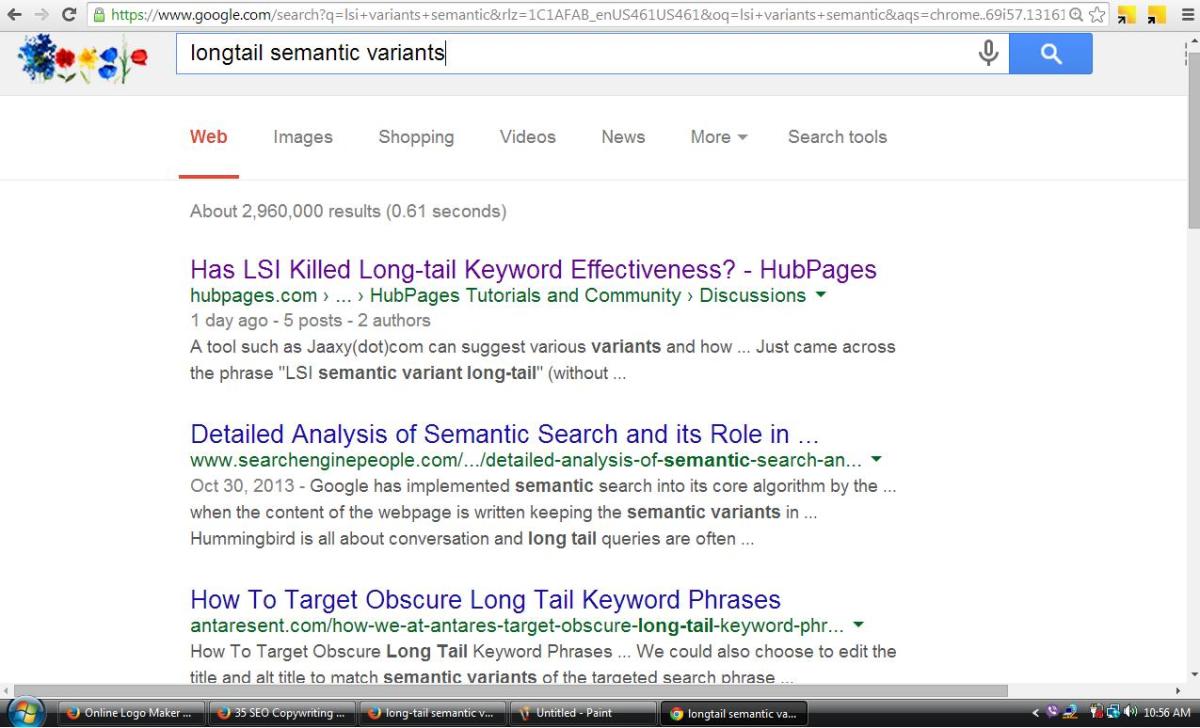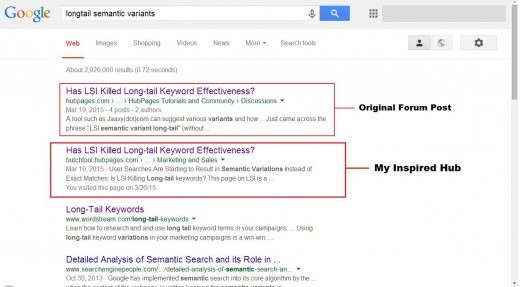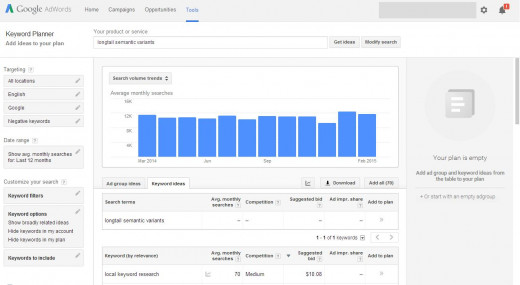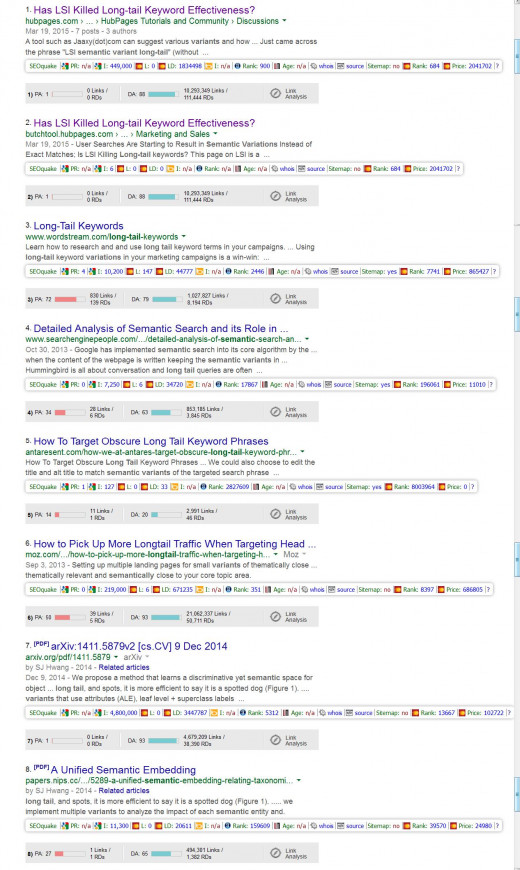- HubPages»
- Business and Employment»
- E-Commerce & How to Make Money Online»
- Search Engine Optimization
Ranking Long Tail Keywords: LSI Semantic Variant Case
Are You Worried about Google's Algorithm Changes?
It seems like Panda and Penguin have really smacked some sites down the ranks after the algorithm updates, and more changes seem to be coming all the time. Are you concerned for your site?
Experiment with Long Tail Keywords and Semantic Variants
Sometimes when you are learning SEO, you stumble upon a ranking that flat out blows your mind.
You find yourself wondering "how did that worthless site rank in Google so fast?" or "how did that random blog post outrank those bigger sites?"
Frankly, now is a very interesting time in search engine optimization methods because the new algorithm updates have changed the game a lot.
Suddenly, being an old site with a huge number of back-links may work against you if you ever bought links or had a number of links wind up on spam sites some other way (coughs).
I recently had an up-close encounter with this when a random forum post I made started ranking #1 to #4 for several long-tail keywords.
Wanting to figure out exactly which semantic variations and key phrases were helping the forum post rank, I built a hub around the same ideas in the hopes of imitating the fast page rank.
Sure enough, I did it. My hub ranked in a week!
Below, you can see the screenshots of the original forum post rank ("Has LSI Killed Long-Tail Keyword Effectiveness") and the SERP (search engine result page) showing my new hub joining the forum post at the top.
LSI and Long Tail Forum Post Ranking Day 1: SEO Mystery?

Top of the Rankings on Google in a Week - Go Long-Tail Keywords!

What Are the Real Implications of This?
So, it is great that I ranked a page among so many search results and all, but how is this information useful?
Well, this gives us some great points to analyze regarding how to create organic traffic through search by using selected semantic variations of keywords, and how to assess niche competition on the result page.
Let's start with a simple question: does the keyword I ranked for actually have a decent monthly search volume that will result in organic traffic?
Now, the purpose of this experiment for me was to see if I could recreate the fast ranking of the initial forum post that was created without any thought to researching key terms for ranking (most likely because of the natural word semantics and variations that rank well these days due to the rise of latent semantic indexing), but you need to check if anyone is actually looking for that long-tail phrase you have masterfully crafted.
You can use Google Adwords Keyword Planner for free to accomplish this, although there are some paid keyword research software that can provide a more in-depth analysis.
Here is the page you want to find with the term I ranked #2 out of 2.92 million results.
Screenshot showing the Google Adwords Keyword Planner

Not Much Traffic with the Exact Match
Well, nuts.
The exact match for the phrase I rank so well in doesn't actually get all that much traffic. Darn.
As you can see by the overall graph of monthly search volume data, though, the broad matching keyword groups may include a lot of long-tail variants that I haven't searched for that may bring in traffic, as well.
While you should always do your keyword research before crafting your content, it is highly likely that you will be unable to find all of the possible word variations that may drive traffic to your site.
Overall, you should be aiming to have a wide variety of phrasing and sentence structure to ensure a natural usage of relevant keywords for your niche or topic (which is exactly what LSI is aiming to rank highly).
However, researching keywords for SEO purposes is still very important so that you can ensure that your content includes at least a few of the most important varieties of exact match and broad match key terms. You can go through your writing and double check (and tweak the phrasing to fit some in, if needed).
When crafting your content, it is wise to include some shorter keywords that have a high search volume (but likely more competition so it will take time and perseverance to rank well) and several long-tail keywords with a lower search volume for the exact match (but the potential to rank well and drive traffic sooner for a variety of phrasing).
Always hedge your bets by diversifying instead of trying to focus on just one keyword or phrase.
Important Competitor SE Ranking Information

Analyzing the Competition
This is a step that you should always do before selecting the keywords and semantic variations you intend to target.
There is simply no way you will be able to rank for some competitive terms these days. Make sure you aren't wasting time on a high volume search term for which you won't have a chance in hell of ranking.
Some people prefer to manually evaluate this information, but I think top SEO tools like the toolbars I used above are very helpful for this (these are free, by the way).
How Did I Rank Above Pages with More Authority and Back-Links?
This is a great question, although it probably requires another hub to analyze fully since I will need to analyze each site one by one.
Simply put, though, something about these sites clearly didn't pass the sniff test that Google's updated algorithm tried on them.
Or perhaps I'm just some kind of genius in crafting content...
Nah, I guess something must be off with the other sites.
Perhaps these sites engaged in link-building several years ago that is coming back to bite them now.
Modern SEs really want to move away from manipulating search rank with black-hat schemes.
Additionally, as LSI continues to evolve and the database that dictates what frequency keywords should exist in natural writing expands, many more sites may be hit for not using keywords naturally.
If there wasn't something less than ideal happening with those sites, though, there is no way that my forum post and hub should both be above established domains with loads of back-links that have page authority and, in some cases, domain authority that exceed that of my content.
Had I looked at this data before seeing my forum post rank, I wouldn't have thought I could rank so easily.
This shows how important it is to dig deeper when you go to analyze your competition. This may include checking the content quality, back-link profiles, social media status, and other factors.
Learning How to Optimize a Site for Search Engines Is Tricky
Now that I have showed you the recent results I had in ranking my site on Google ("Has LSI Killed Long-Tail Effectiveness?"), I thought I would do a quick review of bad SEO practices and what to always avoid with search engine optimization.
Why? Well, because it is incredibly difficult to learn how to rank a page these days.
This is in no small part due to the fact that there is a crazy amount of bad information out there.
Right now, there is an unprecedented amount of completely worthless and even damaging (will result in your site getting penalized) optimization tips that are floating around online.
Please be sure that you always check if the information you are getting is current, or whether it is based on SEO tactics from before the implementation of Panda and Penguin into the Google search algorithm.
The simplest way to do this is to ignore search engine tricks that used to work but now result in penalties and a nosedive from the SEPR (search engine page rank).
Well, what are these nasty pieces of search optimization advice?
Worst SEO Hacks You Must Avoid
I wrote a separate hub that goes into these in detail, but I'll just make this short and sweet here.
Don't Employ Keyword Stuffing
Stuffing in keywords will kill your site. Point blank.
People still worry about things like keyword density, but it is no longer a matter of there being a percentage you need for any given keyword.
Instead, Google has wisely collected a large database and analyzed how often a particular keyword will organically, naturally appear in writing that isn't promotional or a load of spam.
This means, a piece referencing "SEO" or "Google" will probably naturally be written with a higher density than a piece trying to squeeze in the term "search engine optimization tips". If you try to squeeze a long-tail keyword variation into your content too many times, it will sound completely ridiculous, and Google isn't going to let you get away with that anymore.
Buy or Spam Low-Quality Back-links
Please just don't do this. Ranking organically takes time, but buying links is a super risky bet.
The big search engines have already stated that they are on a never-ending mission to explore your strange new back-link profile and destroy your rankings if they indicate that you have likely bought links.
Buy or Create Low-Quality Content
Having search engine optimized content means that you must avoid having inferior junk on your site.
If your content is meant to be in English but is barely readable, then you need to pay a bit more for your content in the future (or take some writing lessons).
Additionally, if your content is little more than a sales page that redirects customers to Amazon, Ebay, etc. and provides little or no useful information to a web visitor, then you need to rethink your content strategies.
Modern search engines are looking for content that is genuinely useful to their readers. This means that these types of low-quality junk are not going to be acceptable any longer.








